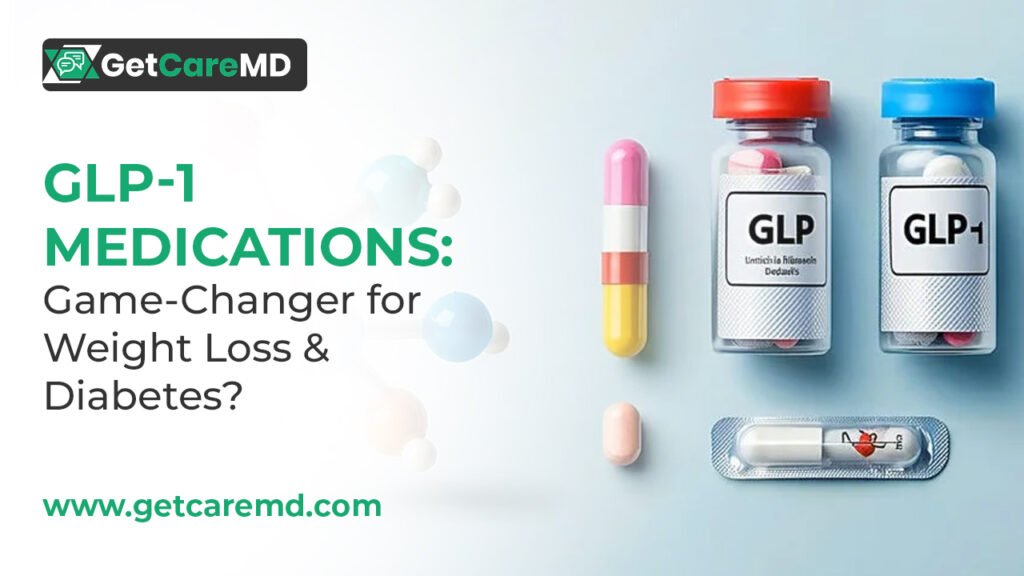GLP-1 medications, often known by brand names like Ozempic, Wegovy, and Mounjaro, have captured the attention of millions. From social media feeds to news headlines, they are being hailed as a revolutionary new tool for weight loss and Type 2 Diabetes management. But with all the hype, it’s natural to wonder: are they truly a game-changer, or is it just a passing trend?
At GetCareMD, we believe in providing clear, professional, and empathetic guidance. Our goal is to help you understand the science behind these medications, their potential benefits, and the important considerations you need to discuss with a healthcare provider. This post will demystify GLP-1s, so you can make an informed decision about your health journey.
What Are GLP-1 Medications and How Do They Work?
GLP-1 stands for Glucagon-Like Peptide-1. It’s a natural hormone your body produces after you eat. This hormone has several key functions:
- It Stimulates Insulin Release: When your blood sugar rises after a meal, GLP-1 helps signal your pancreas to release insulin. This process helps lower blood sugar to a healthy level.
- It Slows Digestion: GLP-1 slows down the rate at which food leaves your stomach, helping you feel full and satisfied for longer. This is a primary reason why these medications are so effective for weight loss.
- It Curbs Appetite: By acting on centers in the brain, GLP-1 reduces feelings of hunger and cravings, which leads to a decrease in overall food intake.
GLP-1 receptor agonists are a class of drugs that mimic this natural hormone. By providing a consistent, sustained level of GLP-1 in the body, they help regulate blood sugar and significantly reduce appetite, leading to substantial weight loss.
A Closer Look at GLP-1s for Type 2 Diabetes
Historically, GLP-1 medications were developed to treat Type 2 Diabetes. They are a powerful tool for controlling blood glucose levels and improving overall metabolic health. The American Diabetes Association (ADA) recommends GLP-1 receptor agonists as a preferred treatment option for many patients with Type 2 Diabetes, especially those who also have a high risk of cardiovascular disease (CVD) or chronic kidney disease.
These medications not only help lower A1C (a key marker of long-term blood sugar control) but also often lead to weight loss, which can be a significant benefit for people living with Type 2 Diabetes.
GLP-1s for Weight Loss: The “Game-Changer” Aspect
While weight loss was an observed side effect in early diabetes studies, clinical trials have since proven the remarkable efficacy of these drugs for weight management in people with obesity. Medications like Wegovy and Zepbound, which contain higher doses of the active ingredients, have been specifically FDA-approved for chronic weight management.
Research published in reputable medical journals shows that patients can achieve significant and sustained weight loss with these medications. A study published in the New England Journal of Medicine showed that participants on a high dose of a GLP-1 medication lost an average of 15% of their body weight over a 68-week period. This level of weight loss was previously only attainable through bariatric surgery.
However, it’s crucial to understand that these medications are most effective when combined with a healthy diet and regular physical activity. As a joint advisory from the American College of Lifestyle Medicine and other organizations emphasizes, medication is a powerful tool, but it is not a substitute for positive lifestyle changes.
Potential Side Effects and Important Considerations
While GLP-1 medications offer immense benefits, they are not without potential side effects. The most common adverse effects are gastrointestinal, including:
- Nausea
- Vomiting
- Diarrhea
- Constipation
These symptoms are usually most prominent when starting treatment or increasing the dose and often subside over time. Our team at GetCareMD specializes in managing these side effects to ensure a more comfortable treatment experience. In rare cases, more serious side effects can occur, which is why it’s essential to have ongoing medical supervision.
It’s also important to note:
- Psychological Impact: Weight loss can have a profound impact on mental health. Some users report changes in mood or anxiety. If you are considering these medications, it is wise to discuss your mental health with a provider. GetCareMD offers a range of mental health (psychiatry) services, including support for depression and anxiety relief, which can be an important part of your overall care.
- Rebound Weight Gain: The effects of these medications typically cease when a person stops taking them. A study by the American Medical Association found that many patients who discontinued GLP-1 therapy regained a significant portion of the weight they had lost. This highlights the importance of creating sustainable, long-term health habits.
Is a GLP-1 Medication Right for You?
Deciding whether a GLP-1 medication is the right choice is a personal decision that requires a thorough medical evaluation. These are not “magic pills” but powerful medical tools that should only be used under the supervision of a qualified healthcare provider.
Our medical staff at GetCareMD can provide a comprehensive consultation to evaluate your specific health needs and goals. We offer personalized care plans for weight loss and Type 2 Diabetes management, and we can help you determine if a GLP-1 medication is a safe and effective option for you.
We understand that navigating the healthcare system can be complicated, which is why we offer simple, transparent pricing through our self-pay option. You can get the care you need without the hassle of dealing with insurance claims.
To learn more or to schedule an appointment with one of our experienced providers, visit our website at getcaremd.com or contact us at medicalstaff@getcaremd.com.


